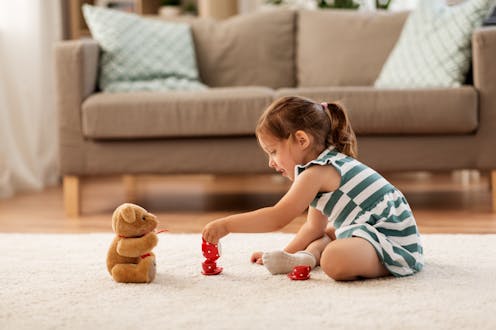Why do you get pins and needles in your legs when you sit on them?
- Written by Christian Moro, Associate Professor of Science & Medicine, Bond University

Why do you get bubbles (pins and needles) in your legs when you sit on them?
– Bonnie, aged four, Melbourne
That’s a great question, Bonnie.
There are a few reasons we might get a feeling of pins and needles inside our bodies. Sometimes, this feeling happens when we get sick or hurt ourselves[1]. It can also happen because of different health conditions[2], or because of our genes (we inherit our genes from our parents).
We might also experience pins and needles when we sit in the same position for too long, or when we squish a particular part of our body, like our legs. This is what you’ve asked about, so that’s what we’ll talk about in this article.
The feeling of pins and needles, which you might also call “tingles”, comes from our nerves[3].
Nerves are made up of special cells that send electrical signals – basically messages – between our brain[4] and our body. So nerves help our brain talk to our muscles and other parts of our body to control things like movement[5].
Let’s take a closer look at nerves, and what role they play in giving us pins and needles.
Squishing our blood vessels
The nerves in our body need many things to work well, such as nutrients (the good stuff we get from the food we eat), oxygen from the air we breathe, and lots of blood[7]. Our blood helps carry this oxygen, the nutrients and other useful things around our bodies.
The heart pumps blood to all the parts of our body through blood vessels[8], which are like little tubes.
If we sit on our legs for too long, it can squash some of the smaller blood vessels in that part of our body. This means the blood cannot flow properly anymore. And then, any nerves which need a supply of blood from those vessels are no longer getting the nutrients or oxygen they need.
This causes the nerves to slow down, trying to save their energy. It’s a bit like they’ve fallen asleep. The area will become quite numb and you won’t feel much.
You might get this feeling when you sit in one position for too long, or squash a hand or arm under your weight for a while. Have you ever woken up in bed[9] with a dead arm?
Then, when you finally move around, the blood vessels instantly open, and blood rushes into the area and wakes the nerves up.
The nerves can then start firing their electrical signals[11]. As they wake up, we get a strange feeling. This is the pins and needles sensation. Often, the area might also feel numb, or become a bit hard to move.
There’s no need to worry
The medical term for this tingling, pins and needles, bubbles or numbness is “paraesthesia[12]”.
Some people might find this feeling a bit scary. But there’s usually no need to worry. If you’ve just been sitting on your legs a little too long, or sleeping on your arm, the area will fill with blood again as soon as you move around a bit.
Then the nerves will once again receive the nutrients and oxygen[13] they need, and you’ll be back to normal in no time.
Hello, curious kids! Do you have a question you’d like an expert to answer? Ask an adult to send your question to curiouskids@theconversation.edu.au
References
- ^ hurt ourselves (www.ninds.nih.gov)
- ^ health conditions (www.msaustralia.org.au)
- ^ nerves (www.ncbi.nlm.nih.gov)
- ^ our brain (youtu.be)
- ^ movement (www.ncbi.nlm.nih.gov)
- ^ Giovanni Cancemi/Shutterstock (www.shutterstock.com)
- ^ blood (kids.frontiersin.org)
- ^ blood vessels (www.ncbi.nlm.nih.gov)
- ^ bed (theconversation.com)
- ^ Lopolo/Shutterstock (www.shutterstock.com)
- ^ electrical signals (www.ncbi.nlm.nih.gov)
- ^ paraesthesia (www.racgp.org.au)
- ^ nutrients and oxygen (www.ncbi.nlm.nih.gov)

















